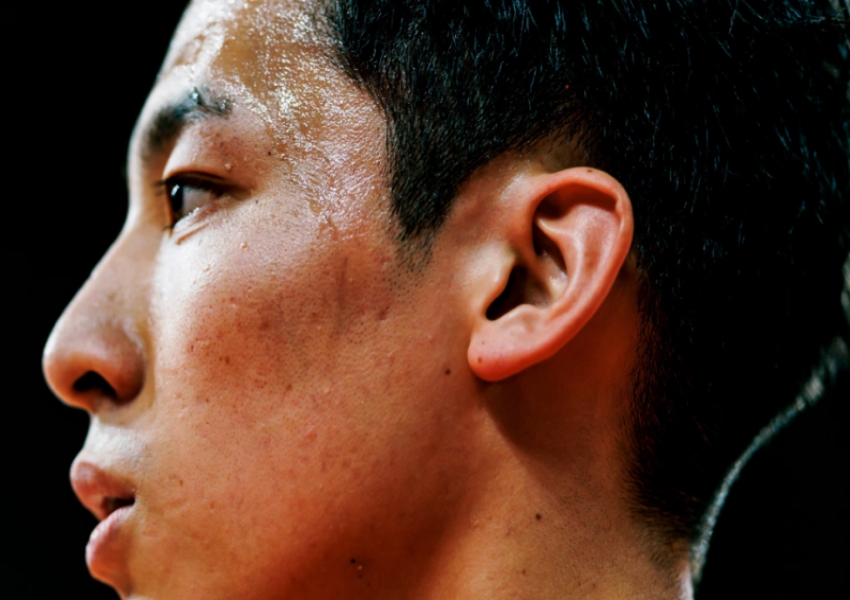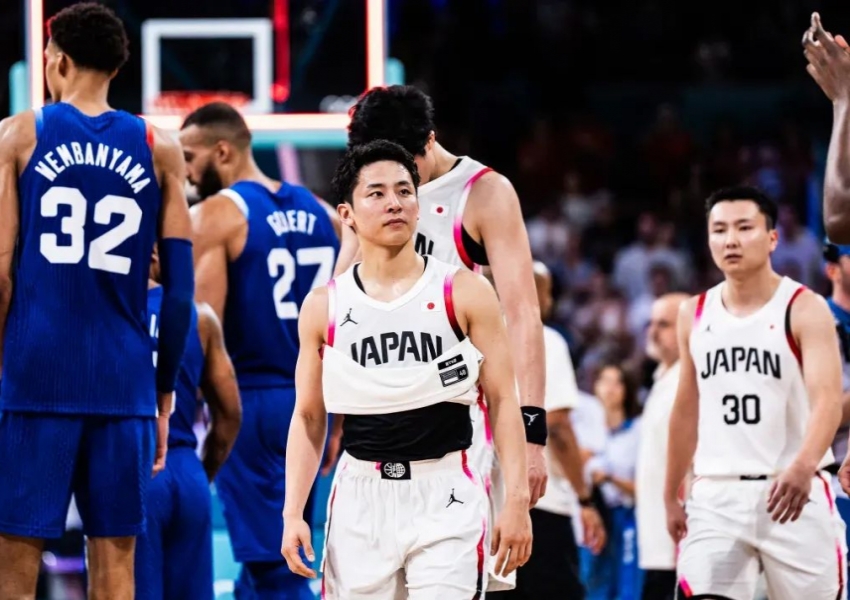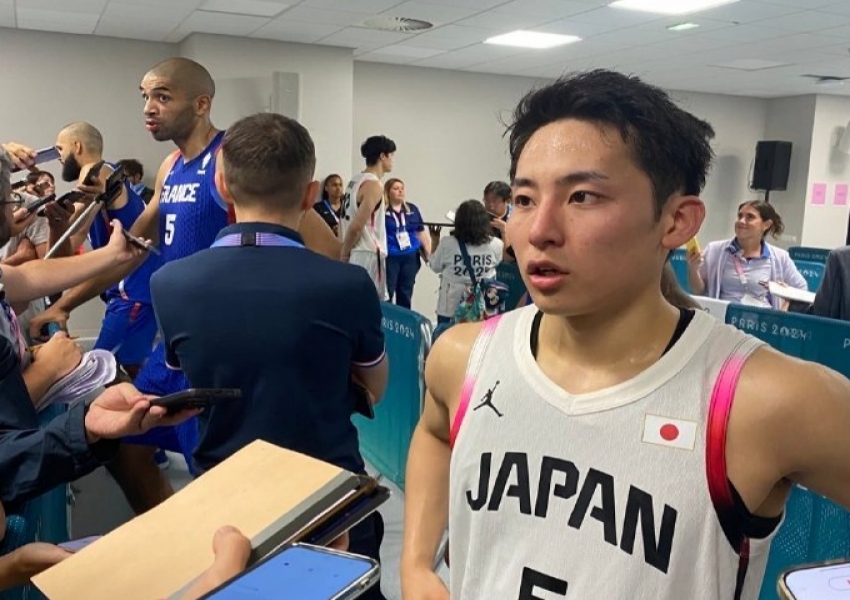29+6+7! World-Class Guard! Why Can't Chinese Basketball Produce Another Yuki Kawamura?
Yuki Kawamura has once again stunned basketball fans worldwide. In the Olympic group stage, Japan's men's basketball team narrowly lost to France, 90-94, in overtime. The game was a tight contest throughout, with both teams battling neck and neck. With 16 seconds left in the fourth quarter, Kawamura made two free throws to give Japan an 84-80 lead, seemingly putting them on the brink of their first Olympic victory in 52 years. However, in a critical defensive play, Japan was called for a controversial foul that resulted in a 3+1 play for France, spearheaded by Mathias Lessort. This moment turned the tide, dragging the game into overtime, where France eventually claimed victory.

The contentious 3+1 play sparked debates among fans, as slow-motion replays and still images suggested that Kawamura did not make contact with Lessort. Many fans accused the referees of bias towards the French team. After the foul was called, Kawamura was visibly confused, displaying a "What?" expression. In his post-game comments, he expressed his disbelief at the call: "I don't think I fouled him. Lessort is a great shooter, and that was a tough shot. He made it." He also apologized to his teammates: "We came here to win, not just to play a good game. We were ready, and we thought we could do it. It was an opportunity against France, but I didn't seize it. I wasn't in control enough. I apologize to my teammates."

Japan's head coach echoed Kawamura's sentiments, stating, "Our point guard was trying to stay away from the opponent. It was a tough call. The free throws were made, and it was a crazy sequence. Our opponent finished strong. I think he (Kawamura) was just a bit too close." Japanese manga artist and creator of "Slam Dunk," Takehiko Inoue, also took to social media to encourage the Japanese team, saying, "It was a great game. I am proud of the Japanese men's basketball team. The whole world believes we fought valiantly. The challenge for the top eight continues. Congratulations to the French team as well."

Despite the controversial foul leading to the game being extended and ultimately lost, Kawamura's performance was outstanding. He played 33 minutes, scoring 29 points on 9 of 26 shooting, including 6 of 15 from three-point range, and making all 5 of his free throws. He also contributed 7 rebounds and 6 assists, leading both teams in scoring and assists. Kawamura's play was even more impressive considering his height of just 1.72 meters (5'8"). His speed was a significant asset, allowing him to penetrate the French defense with ease. He effectively used screens to create space and even managed to shoot over the towering 2.26-meter (7'5") Victor Wembanyama and 2.16-meter (7'1") Rudy Gobert multiple times.
In the crucial fourth quarter, Kawamura scored 10 points, with Japan's last 12 points all involving him. This included a 3+1 play, a layup, a drive-and-kick assist, and four clutch free throws. Unfortunately, the controversial foul turned him into a background character in Lessort's game-tying moment.
Scoring 29 points, grabbing 7 rebounds, and dishing out 6 assists in an Olympic game is no small feat. In the 21st century, only Luol Deng in 2012 and Kevin Durant in 2016 have achieved at least 25 points, 5 rebounds, and 5 assists in an Olympic game. Kawamura's previous game against Germany, the reigning World Cup champions and featuring MVP guard Dennis Schröder, was also noteworthy. He recorded 11 points, 2 rebounds, and 8 assists. Last year at the World Cup, Kawamura made a name for himself against Finland, leading a comeback from an 18-point deficit and finishing with 25 points, 8 assists, and 0 turnovers.
What makes a world-class guard? Yuki Kawamura exemplifies it. Despite his height of only 1.72 meters, his fundamentals are exceptionally solid. In the two Olympic group stage games, he made all seven of his free throws—a testament to his reliability under pressure. Comparatively, does any Chinese guard consistently make five free throws in such high-stakes games?
It is not just Kawamura who stands out; the entire Japanese team demonstrates solid fundamentals and shooting skills. In their game against Germany, they made 12 of 33 three-point attempts (36.4%) and 17 of 20 free throws (85.0%). Against France, they improved to 16 of 37 from beyond the arc (43.2%) and 12 of 14 from the free-throw line (85.7%). Five years ago, at the World Cup, there was a debate about whether China or Japan had the stronger team. Now, it is clear that Japan has pulled ahead significantly. Their style of play aligns perfectly with modern basketball trends, and their world-class guard, Kawamura, is only 23 years old.
Reflecting on the Olympic stage, the two group games prove that Japan's performance at last year's World Cup was no fluke. Watching their games is a mix of admiration and frustration. While it's impressive how well they play, it also raises questions about why China cannot produce such talent. What is the gap, and why does it exist?
Copyright Statement:
Author: focusnba
Source: FocusNBA
The copyright of this article belongs to the author. Reproduction is not allowed without permission.
Recommended Blog
- 9-for-1! How Much Did the Clippers Lose in That Trade?
- Official Debut Confirmed! PUA and Tatum: Is America’s Future Star Forward Really Up to the Task?
- Officially Decided to Trade! Farewell, Chen Yingjun! An Epic Offseason in the CBA
- Zero Points, All Zero Points! Team USA Faces Internal Conflict as KD and LeBron Dominate
- 31 Points and 12 Free Throws: Li Yueru Shines in Olympic Opener After WNBA Stint, Leaving Teammates Stunned
- 4-for-1 Markkanen Trade! The Spurs Make a Bold Move to Shake Up the Western Conference
- No Takers! Has 28-Year-Old D'Angelo Russell Really Declined That Much?
- Olympic Debut: 12 Shots, 17 Points! Goodbye, Thunder! Finally, Giddey Can Lead a Team...
- 15 Shots for 24 Points! Defeating Serbia’s U18 Team! The Only Chinese Forward with NBA Potential…
- Blockbuster Trade Incoming? 76ers Eye Markkanen! An Epic Offseason in the East...
Hot Blog
- Boom! Boom! 100% Shooting Night—Lakers Feeding the NBA’s Best Defensive Center…
- Nightmare: AD Out for the Season—Do the Mavericks Have a Future?
- Kevin Durant = Three First-Round Picks? In Just Two Years, the Suns Lost Big!
- Tension in New York? Mikal Bridges Calls Out Thibodeau’s “Plantation-Style” Rotation!
- Major Decline! What Is De'Aaron Fox’s True Level with the Spurs?
- Completely Out of the Rotation! Why 25-Year-Old Cam Reddish Can't Get on the Court Anymore
- A Miraculous Buzzer-Beater—But What Level Is Kawhi Leonard Really At Now?
- 4,000 Threes! Just How Impossible Is Stephen Curry’s Latest Record?
- $110 Million Over Two Years—Butler Was Worth Every Penny
- $293M Supermax and an MVP? Is There Any Doubt Left for Shai Gilgeous-Alexander?